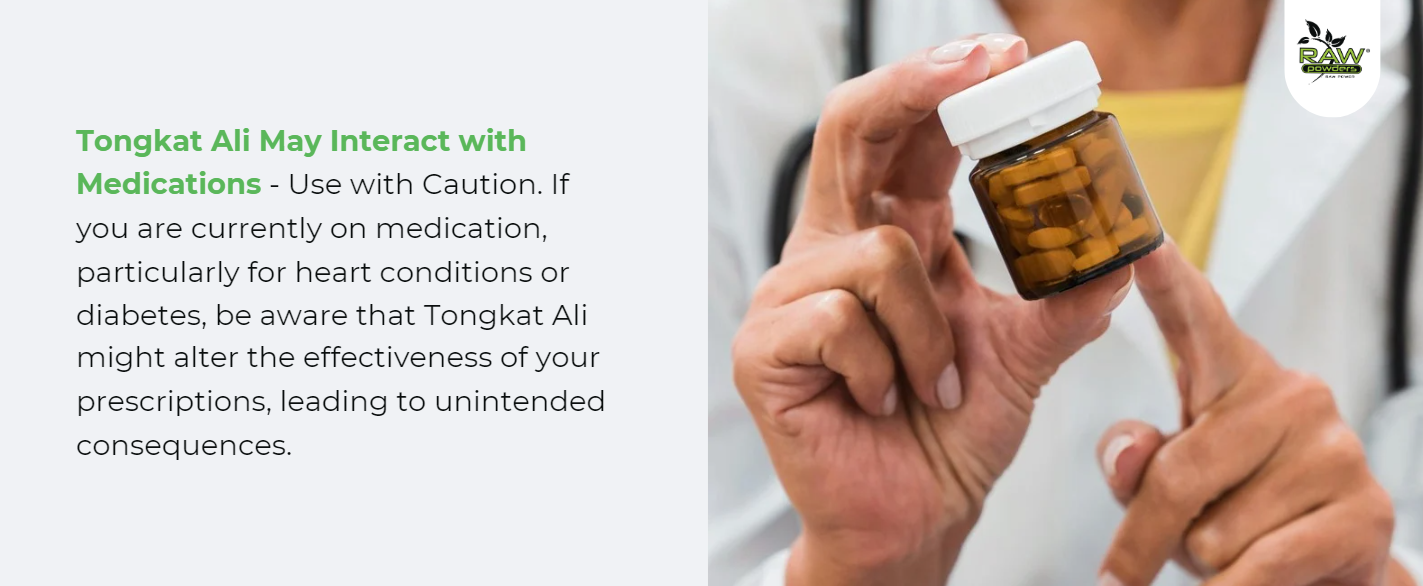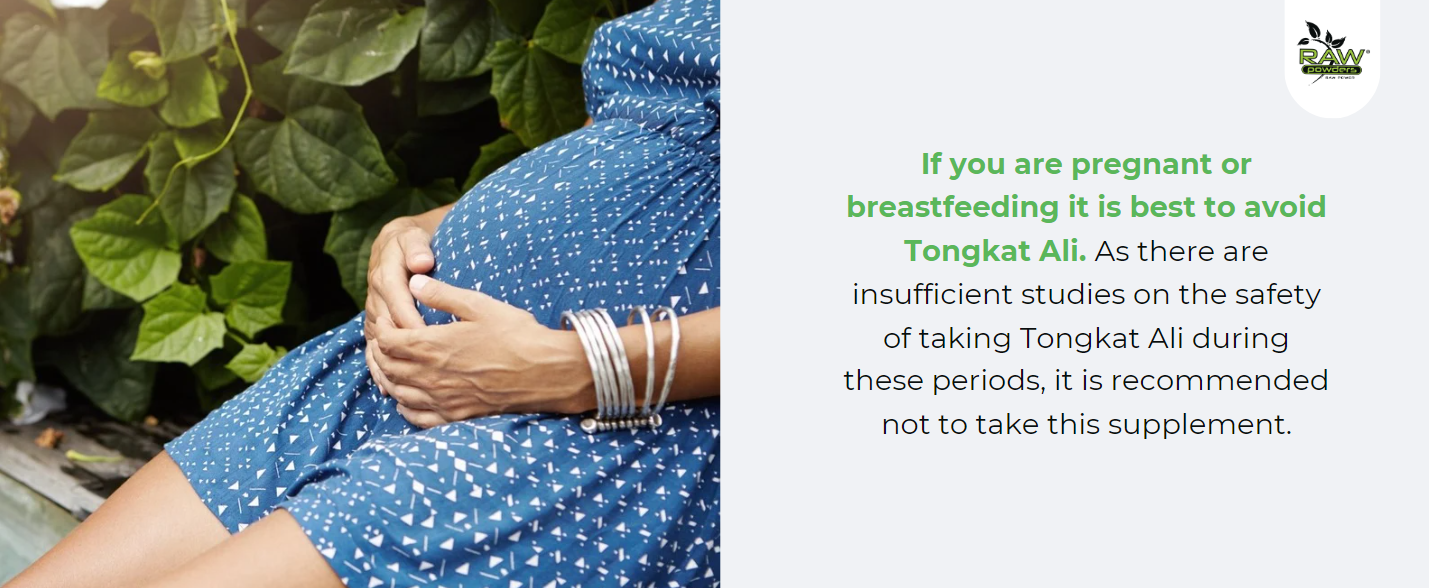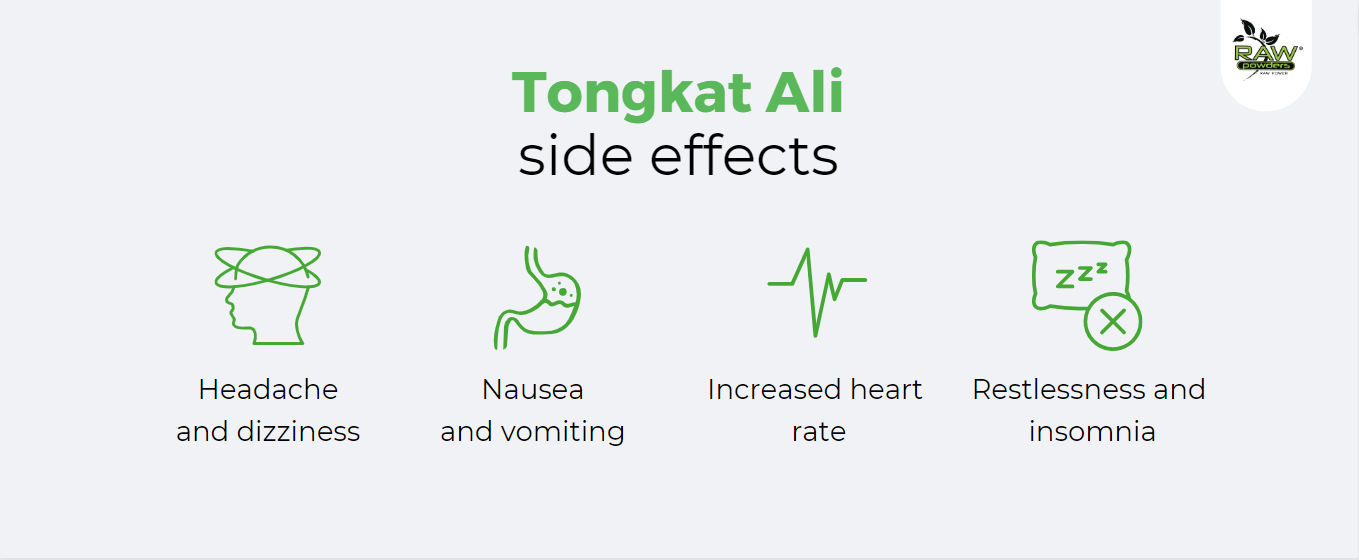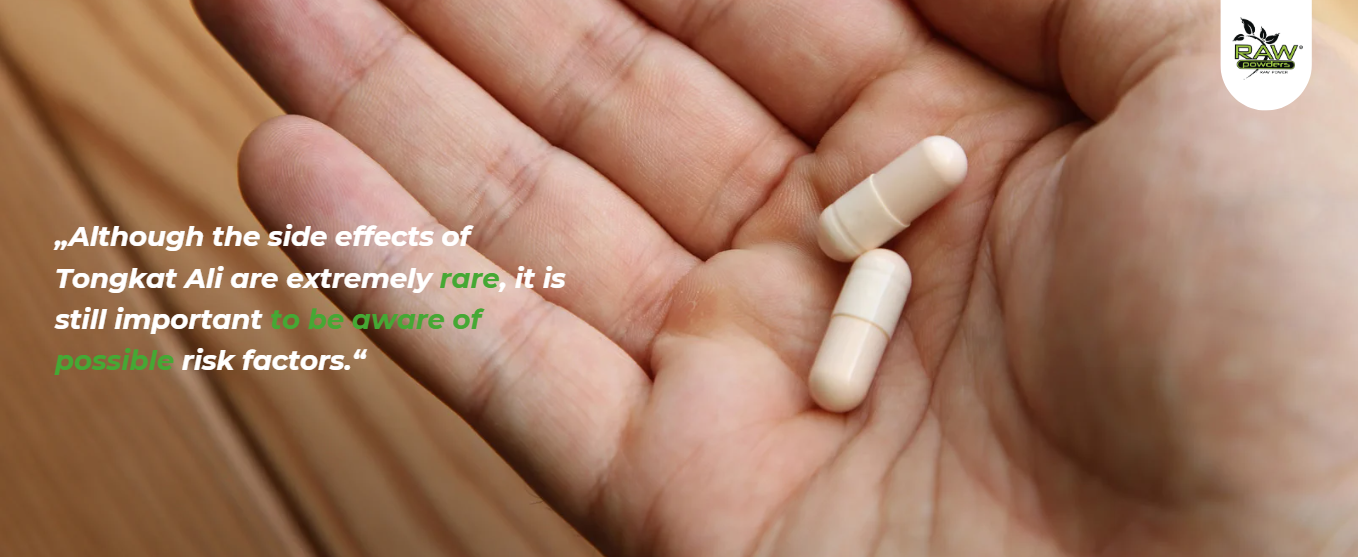TONGKAT ALI SIDE EFFECTS: WHAT YOU SHOULD KNOW


Tongkat Ali, also known as Eurycoma longifolia, is a tree native to Southeast Asia, its leaves and other parts have been used for centuries by traditional medicine practitioners to address a wide range of problems and concerns, including low testosterone, due to their many potential beneficial properties.
However, like any natural preparation or medicine, Tongkat Ali extract can cause side effects, so it's important to understand the potential risks before taking any new supplement, including Tongkat Ali.
Adverse Effects, Precautions and Contraindications
Tongkat Ali, is generally considered safe when used at recommended levels (For more information on the use and dosage of Tongkat Ali, see the blog post - Tongkat Ali dosage.), but caution is advised [1] for individuals with certain health conditions and those using specific medications. This herbal remedy, known for its holistic properties, has associated risks including potential adverse effects like insomnia, anxiety, and restlessness, and should be avoided by those with allergies to its constituents or to members of the Simaroubaceae family.
Read more about what Tongkat Ali is here.
General Safety and Toxicity
- General Safety: A study evaluated the acute and subchronic toxicity of Tongkat Ali, revealing no significant adverse effects at doses up to 2 g/kg body weight per day. However, it did highlight some pharmacological changes in blood parameters, which were considered beneficial [2].
- Combined Formulations: Another study on a polyherbal formulation including Tongkat Ali showed no significant toxicity in rats at doses up to 2000 mg/kg, although some histopathological changes were noted at higher doses [3].
Adverse Effects
- Insomnia, Anxiety, and Restlessness: Secondary sources report side effects such as insomnia, anxiety, and restlessness. These effects are not extensively documented in primary research but should be considered based on anecdotal evidence [4].
- Genotoxicity: Tongkat Ali extract has shown potential genotoxic effects at high doses in in vivo tests, raising concerns about DNA damage, particularly in tissues that are first sites of contact [5].

Precautions and Contraindications
- Blood Glucose and Hypoglycemia: Tongkat Ali may affect blood glucose levels, warranting caution in individuals using hypoglycemic agents. Animal studies have indicated its potential to reduce blood glucose levels [4].
- Immune System Effects: Evidence suggests that it may weaken immune function, advising caution for individuals with compromised immune systems [4].
- Drug Interactions: Tongkat Ali can interact with medications such as propranolol, potentially decreasing their bioavailability. This interaction has been observed in healthy males [6].
- Specific Health Conditions: Individuals with breast or prostate cancer, diabetes, heart disease, kidney disease, liver disease, or sleep apnea should avoid using Tongkat Ali due to potential risks [4].

Pregnancy and Lactation
- There is insufficient data on the safety of Tongkat Ali during pregnancy and lactation, making it advisable to avoid its use during these periods [4].
Reproductive and Hormonal Effects
- Testosterone Levels: Tongkat Ali is known to increase testosterone levels, which can be beneficial for individuals with low testosterone. This effect is achieved by increasing the release rate of free testosterone from sex-hormone-binding globulin (SHBG) [7].
- Aromatase Inhibition: Eurycomanone, a major quassinoid in Tongkat Ali, inhibits aromatase, reducing the conversion of testosterone to estrogen, which may further support testosterone levels [6].
Does Tongkat Ali Make Your Body Stop Producing Testosterone?
It is very important to distinguish between anabolic steroids or synthetic testosterone and natural supplements such as Tongkat Ali. The introduction of synthetic testosterone or anabolic steroids into the body can suppress the body's natural production of testosterone. This is because when testosterone is supplied to the body from an external source, the body often reduces or stops its own production of the hormone. When individuals stop taking steroids or exogenous testosterone, testosterone levels may decrease for a period of time until the body's natural production mechanism is reactivated or restored.
In contrast, the effects of Tongkat Ali in restoring normal testosterone levels appear to be less due to actually “stimulating” testosterone synthesis, but rather by increasing the release rate of “free” testosterone from its binding hormone, sex-hormone-binding-globulin (SHBG). In this way, Eurycoma may be considered not so much a testosterone “booster” (such as an anabolic steroid), but rather a “maintainer” of normal testosterone levels and a “restorer” of normal testosterone levels (from “low” back “up” to normal ranges). This would make Eurycoma particularly beneficial for individuals with sub-normal testosterone levels, including those who are dieting for weight loss, middle-aged individuals suffering with fatigue or depression, and intensely training athletes who may be at risk for overtraining [8].
Also, in accordance with one study, Eurycomanone (the highest concentrated quassinoid in the root extract of E. longifolia) enhanced testosterone steroidogenesis at the Leydig cells by inhibiting aromatase conversion of testosterone to estrogen [6].
Is Tongkat Ali Bad for the Kidneys?
As with all supplements, excessive use or use by individuals with medical conditions can pose a risk.
One of the concerns with herbal supplements, including Tongkat Ali, is the possible adulteration or use of impurities in supplements. Some products marketed as Tongkat Ali may contain other ingredients or contaminants that may be harmful, including substances that may affect kidney function. It is very important to make sure that you are getting a pure, high quality product from a reputable source.
It is always possible that individual sensitivities or allergic reactions may cause adverse effects, including on the kidneys.
Like many herbal supplements, Tongkat Ali may interact with medications or other supplements. These interactions may have unintended effects, including effects on the kidneys.
Is Tongkat Ali Safe for the Heart?
There is little direct evidence that Tongkat Ali has harmful effects on the heart when taken at recommended doses. Some studies suggest that it may have antioxidant properties and other beneficial properties that may benefit cardiovascular health. For more information on the potential benefits of Tongkat Ali, see the blog post Tongkat Ali benefits.
As Tongkat Ali can increase energy levels, there may be concerns about its possible stimulant effects and its effects on blood pressure and heart rate. So far, there is no strong evidence that Tongkat Ali has a significant negative effect on blood pressure. However, individual reactions may vary.
One of the important risks of herbal supplements, including Tongkat Ali, is possible adulteration. Some supplements marketed as Tongkat Ali may contain contaminants or other ingredients that can affect the heart. It is therefore very important to purchase a pure, high quality product from a reputable manufacturer.
As with any supplement or medicine, the effects of interactions with other medicines are possible. For example, if a person is taking heart medication, there may be interactions that can affect heart function or blood pressure. Particular caution should be exercised by individuals who already have heart problems. Even if a substance is generally considered safe for the general population, it may pose a risk to a person with heart disease.
The usage is authorized but must be under medical supervision as their interaction with certain drugs, such as Sildenafil (Viagra), tadalafil (Cialis) and vardenafil and other synthetic PDE-5i drugs, can cause negative effects. Patients suffering from cardiovascular diseases such as hypertension, atherosclerosis are mostly treated with drugs containing nitrates, consequently combining such drugs with synthetic PDE-5i may drastically lower their blood pressure (Stief et al. 1998). Therefore, the unknowing consumption of such HMPs (Herbal Medical Products) that contain undeclared synthetic PDE-5i may pose a serious health threat to the patient [9].
Other issues
In accordance with a meta-analysis (2021) of 9 studies Only one clinical study reported adverse effects associated with E. longifolia treatment, which included gastrointestinal symptoms and itching, while in another study it had adverse events in both treated and placebo groups [10].
EU Regulation Safety of Eurycoma longifolia (Tongkat Ali) root extract as a novel food pursuant to Regulation (EU) 2015/2283 says that in EU safety of the Tongkat Ali has not been established under any condition of use. In high doses it has the potential to induce DNA damage, which is of concern, particularly locally for tissues that represent first sites of contact [5].
Important to know
Although the side effects of Tongkat Ali are extremely rare, it is still important to be aware of possible risk factors. If you notice any side effects, you should stop taking Tongkat Ali and consult a healthcare professional.
You should always consult your doctor before taking any new supplement (including Tongkat Ali) - especially if you are taking other medicines, have a chronic condition or are pregnant or breastfeeding. A healthcare professional can help you understand how Tongkat Ali may affect you and whether it is safe for your specific health needs.
Medical Disclaimer
The information provided in our articles is solely for educational purposes and should not be considered medical advice or instruction. No action or inaction should be taken based solely on the contents of this information. Readers should consult their health care professional on any matter related to their health and well-being. The information and opinions provided here are believed to be accurate and sound, based on the best judgment available to the authors, but readers who fail to consult with appropriate health authorities assume the risk of any injuries. The publisher is not responsible for errors or omissions.
Please be aware that different countries may have specific regulations and that this disclaimer does not replace the need for consultation with a healthcare provider before beginning or changing a treatment or supplement regimen. The information contained in this article is not intended to diagnose, treat, cure, or prevent any disease. Individual results may vary.
References
- Catherine Ulbricht, Julie Conquer, Kelly Flanagan, Richard Isaac, Erica Rusie, Regina C Windsor. An evidence-based systematic review of tongkat ali (Eurycoma longifolia) by the Natural Standard Research Collaboration. Review: J Diet Suppl. 2013 Mar;10(1):54-83. doi: 10.3109/19390211.2012.761467. PMID: 23419023. https://pubmed.ncbi.nlm.nih.gov/23419023/.
- Li, C., Liao, J., Liao, P., Huang, W., Tse, L., Lin, C., Kang, J., & Cheng, Y. (2013). Evaluation of Acute 13-Week Subchronic Toxicity and Genotoxicity of the Powdered Root of Tongkat Ali (Eurycoma longifolia Jack). Evidence-based Complementary and Alternative Medicine : eCAM, 2013. https://doi.org/10.1155/2013/102987.
- Teh, B., Ahmad, N., Rasid, E., Zolkifli, N., Zakaria, U., Yusoff, N., Zulkapli, A., Japri, N., Lee, J., & Muhammad, H. (2021). Herbal-Based Formulation Containing Eurycoma longifolia and Labisia pumila Aqueous Extracts: Safe for Consumption?. Pharmaceuticals, 14. https://doi.org/10.3390/ph14020142.
- Ulbricht, C., Conquer, J., Flanagan, K., Isaac, R., Rusie, E., & Windsor, R. (2013). An Evidence-Based Systematic Review of Tongkat Ali (Eurycoma longifolia) by the Natural Standard Research Collaboration. Journal Of Dietary Supplements, 10, 54 - 83. https://doi.org/10.3109/19390211.2012.761467.
- Turck, D., Bohn, T., Castenmiller, J., Henauw, S., Hirsch‐Ernst, K., Maciuk, A., Mangelsdorf, I., Mcardle, H., Naska, A., Peláez, C., Pentieva, K., Siani, A., Thies, F., Tsabouri, S., Vinceti, M., Cubadda, F., Frenzel, T., Heinonen, M., Maradona, M., Marchelli, R., Neuhäeuser‐Berthold, M., Poulsen, M., Schlatter, J., Loveren, H., Matijević, L., & Knutsen, H. (2021). Safety of Eurycoma longifolia (Tongkat Ali) root extract as a novel food pursuant to Regulation (EU) 2015/2283. EFSA Journal, 19. https://doi.org/10.2903/j.efsa.2021.6937.
- Bin-Seng Low 1, Sy-Bing Choi, Habibah Abdul Wahab, Prashanta Kumar Das, Kit-Lam Chan. Eurycomanone, the major quassinoid in Eurycoma longifolia root extract increases spermatogenesis by inhibiting the activity of phosphodiesterase and aromatase in steroidogenesis (2013). . J Ethnopharmacol. 2013 Aug 26;149(1):201-7. doi: 10.1016/j.jep.2013.06.023. Epub 2013 Jun 27. https://pubmed.ncbi.nlm.nih.gov/23810842/.
- Henkel, R., Wang, R., Bassett, S., Chen, T., Liu, N., Zhu, Y., & Tambi, M. (2014). Tongkat Ali as a Potential Herbal Supplement for Physically Active Male and Female Seniors—A Pilot Study. Phytotherapy Research, 28. https://doi.org/10.1002/ptr.5017.
- Shawn M Talbott, Julie A Talbott, Annie George, Mike Pugh. Effect of Tongkat Ali on stress hormones and psychological mood state in moderately stressed subjects. J Int Soc Sports Nutr. 2013 May 26;10(1):28. doi: 10.1186/1550-2783-10-28. PMID: 23705671 PMCID: PMC3669033. https://pubmed.ncbi.nlm.nih.gov/23705671/.
- Bashir Mohammed Abubakar, Faezah Mohd Salleh, Mohd Shahir Shamsir Omar, Alina Wagiran. Assessing product adulteration of Eurycoma longifolia (Tongkat Ali) herbal medicinal product using DNA barcoding and HPLC analysis. Pharm Biol. 2018 Dec;56(1):368-377. doi: 10.1080/13880209.2018.1479869. PMID: 30058427 PMCID: PMC6130542. https://pubmed.ncbi.nlm.nih.gov/30058427/.
- Kristian Leisegang, Renata Finelli, Suresh C Sikka, Manesh Kumar Panner Selvam. Eurycoma longifolia (Jack) Improves Serum Total Testosterone in Men: A Systematic Review and Meta-Analysis of Clinical Trials. Review: Medicina (Kaunas). 2022 Aug 4;58(8):1047. doi: 10.3390/medicina58081047. PMID: 36013514 PMCID: PMC9415500. https://pubmed.ncbi.nlm.nih.gov/36013514/.





_front%20(1)-250x250.png)



_front%20(1)-250x250.png)

-(NN)_front%20(1)-min-250x250.png)

_front%20(1)-250x250.png)


_front%20(1)-min-250x250.png)
_front%20(1)%20(1)-250x250.png)
_front%20(1)%20(1)-250x250.png)
_front%20(1)-min-250x250.png)
_front%20(1)-min-250x250.png)
_front%20(1)%20(1)-250x250.png)
_front%20(1)%20(1)-250x250.png)



